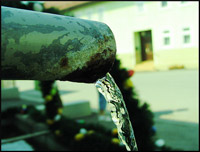
| Canada - Human Rights At Home Matter | 28 February 16 |

The delegation is being led by Human Rights Watch, which spent approximately a year researching the water and sanitation conditions in a number of Ontario First Nations, including Shoal Lake 40, Neskantaga, Grassy Narrows and Batchewana. All three communities were among five studied by Human Rights Watch, which found Canada to be violating treaty rights on water and sanitation. "The chronic neglect of basic human rights in Grassy Narrows is extremely troubling and the ongoing cost in human suffering and cultural loss is staggering," said Craig Benjamin, Indigenous rights campaigner with Amnesty International Canada. Indigenous peoples' organizations and human rights groups are calling on the federal government to acknowledge the serious concerns of First Nations, Inuit and Metis peoples in Canada and to make clear commitments to action as the country's record is reviewed before a UN human rights body. 30 civil society organizations took part in the UN's review of Canada's obligations under the International Covenant on Economic, Social and Cultural Rights (ICESCR). "Unfortunately, Canada risks getting off to a bad start," said Alex Neve, Amnesty International Canada. "The recently elected federal government has pledged to build a new relationship with Indigenous peoples based on respect for rights as set out in the Treaties, the Constitution and international human rights instruments. We were deeply disappointed that their written response to the UN Committee continued the previous government's practice of downplaying and misrepresenting the profound gaps in human rights faced by Indigenous peoples in Canada." Judy Da Silva, who has travelled to Geneva from the Grassy Narrows First Nation, said, "Some of our children continue to be born with mercury poisoning and for decades nothing has been done to clear the poison from our river. In the past Canada has not respected our rights but I still have hope that the tide will finally turn for us and that the Prime Minister will honour his word."
View February 25, 2016 Huffington Post article |
|
 Print version Print version |
Top |
